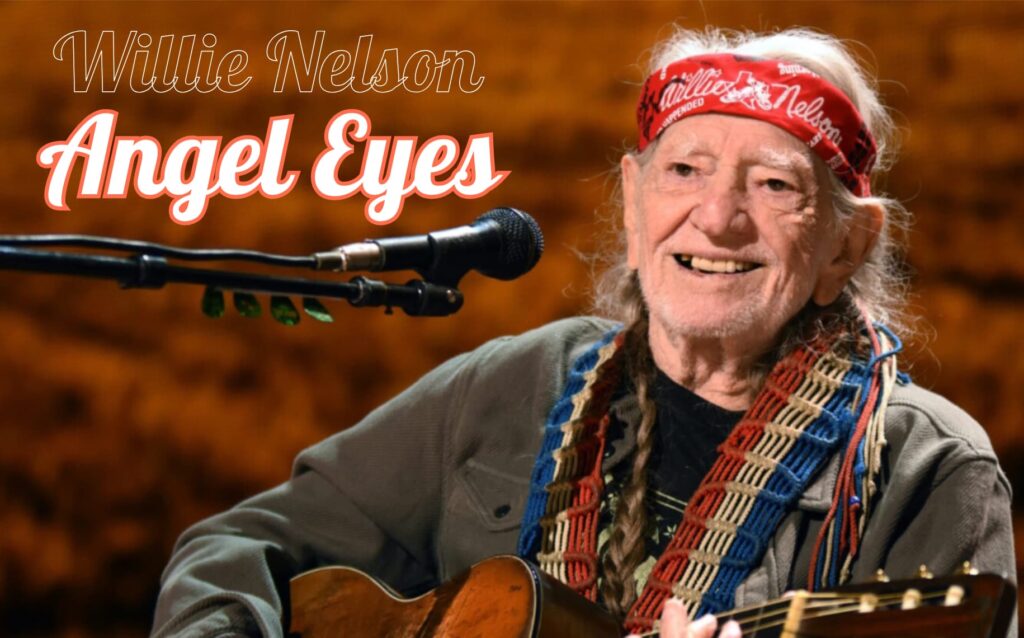
An Ode to the Heartbreak and Haunting Memory of a Lost Love
Long before streaming services and curated playlists, there were moments in time when a particular melody would find you and refuse to let go. You’d hear it drifting from a car radio on a dusty summer highway, or maybe in a quiet, smoke-filled corner of a bar where the world seemed to slow down for just a few minutes. For many of us, especially those of a certain vintage, one of those unforgettable moments came with the release of Willie Nelson‘s 1984 album, aptly titled Angel Eyes. This wasn’t a record of chart-topping country hits in the traditional sense. In fact, it was a quiet, jazz-infused masterpiece that largely flew under the radar, peaking at No. 116 on the Billboard 200 albums chart. And yet, the title track, “Angel Eyes,” became a poignant, deeply personal touchstone for anyone who has ever felt the sting of a love that slipped away.
The song itself is not an original Willie Nelson composition. It’s a classic from the Great American Songbook, a jazz standard written by Matt Dennis and Earl Brent back in 1946. Over the decades, it has been sung by an illustrious list of greats, from Frank Sinatra to Ella Fitzgerald. But when Willie Nelson put his weathered, world-weary voice to it, something magical happened. He didn’t just sing the words; he embodied them. He made the heartbreak his own, transforming a sophisticated jazz piece into a raw, honest country ballad. This version, a standout on the album, also features a stunning duet with the legendary Ray Charles, a collaboration that fused two iconic voices and two distinct musical worlds into one timeless moment of sorrowful beauty. The story behind the recording is a testament to the album’s intimate, personal feel, as it was captured at Willie Nelson‘s own Pedernales recording studio in Texas.
The meaning of “Angel Eyes” is as timeless as the melody itself. It’s the lonely lament of a person drinking late into the night, haunted by the memory of a past love. The narrator isn’t just missing a person; they are missing a specific, cherished part of them—the “angel eyes” that held them captive. It’s a song about the kind of heartbreak that doesn’t just pass with time, but instead becomes a permanent, aching part of you. The lyrics paint a picture of a man trying to convince himself he’s moved on, but the whiskey and the lonely late-night hours reveal the truth: he’s still hopelessly lost in the memory of those eyes. The song’s slow, deliberate pace and the mournful cry of Willie Nelson‘s vocals are a perfect match for the lyrical theme of regret and longing. It’s not a song for dancing or celebration; it’s a song for sitting alone in the quiet, letting the flood of memories wash over you.
For the older generation, this song resonates with a particular power. It’s a reflection of a time when relationships were often more a matter of fate and circumstance than endless options. It speaks to the kind of enduring love that, even when gone, leaves a mark on your soul. The song doesn’t offer any easy answers or happy endings. It simply acknowledges the pain of memory and the quiet dignity of carrying that pain. It’s a beautiful, melancholic masterpiece that reminds us that some loves never truly leave us, no matter how much time passes. It’s a memory, a feeling, and a song, all wrapped into one. And every time you hear it, it’s as if you’re sitting right there with Willie, in that same smoky room, raising a glass to a ghost.